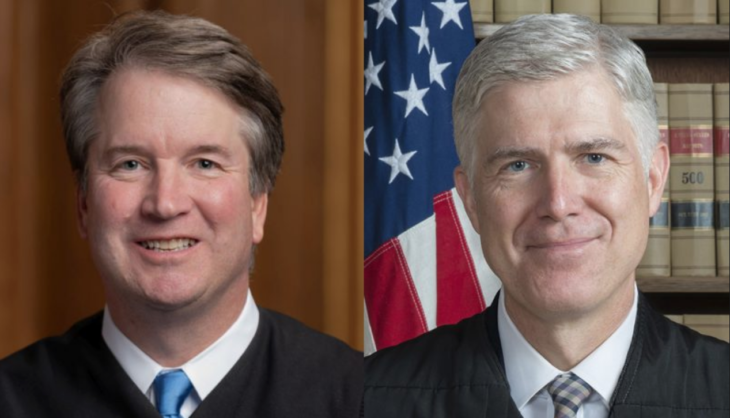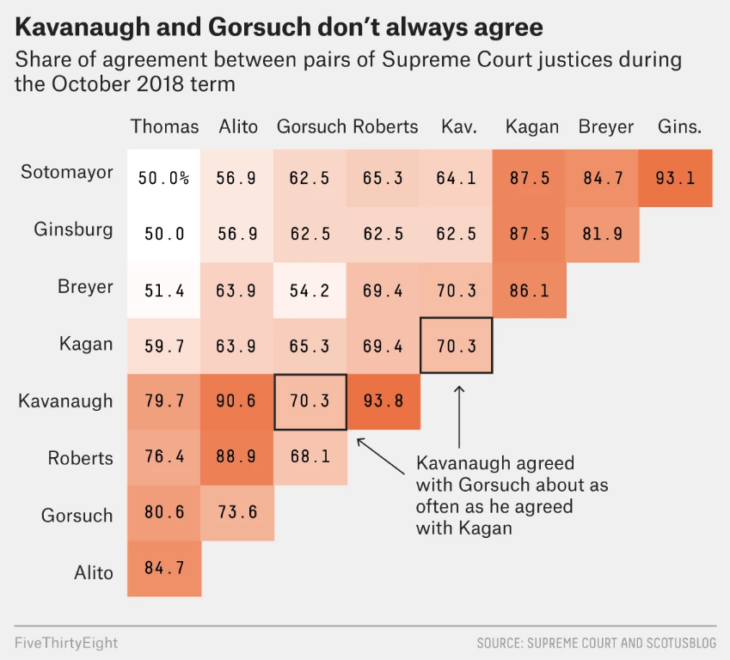
People often point to the fact that President Trump appoints Supreme Court justices “such as” Neil Gorsuch and Brett Kavanaugh. But do these two actually represent a distinct type? Maybe, but an article on “538” suggests that it’s too soon to know for sure:
Using SCOTUSBlog’s final statistics, I looked at the justices’ votes throughout the term. In these pairings, Kavanaugh closely aligned with Roberts and Alito, voting with Roberts 94 percent of the time and with Alito 91 percent of the time. But he only voted with Gorsuch 70 percent of the time — which meant that he voted with his fellow Trump appointee as often as he voted with liberal justices Elena Kagan and Stephen Breyer. Gorsuch, by contrast, voted most frequently with Thomas.

Two quick points:
I understand that many Supreme Court cases are non-controversial, so voting with liberal justices 70% of the time doesn’t tell us very much. In this sample, 39% of the cases were unanimous. But both Kavanaugh and Gorsuch would (by definition) vote with the liberals in those cases. So it remains true that Kavanaugh voted with liberals as often as with Gorsuch in even the more controversial cases.
I also understand that Kavanaugh has only been there for one term, and hence the sample may not be statistically significant. (I believe it was around 72 total cases.) It’s too soon to draw firm conclusions.
It’s also unclear as to why these two justices differ so often. Kavanaugh seems in some sense more “moderate” in his voting, but there are exceptions:
Roberts and Kavanaugh are more ideologically moderate than Gorsuch, but Gorsuch was more of a loose cannon. He joined the liberals in more closely divided cases than any of his conservative colleagues. That made him the “swingiest” conservative on the court, even though it was Roberts who ultimately determined the outcome of one of the most closely watched cases of the term when he voted to keep a question about citizenship off the 2020 census form for the time being.
Here’s a question for commenters who follow this more closely than I do. I am aware of different types of “judicial conservatives”. Some view the Constitution as a document that severely restricts what the federal government can do. Others, such as the late Robert Bork, prefer that the courts mostly defer to the decisions of the legislative and executive branches. Is it possible to discern a systematic difference in the type of conservatism practiced by these two new justices? Thanks.
HT: David Levey


READER COMMENTS
Chris
Jul 7 2019 at 3:37pm
538 should just call Gorsuch “unpredictable” as “loose cannon” implies too much. Further, thus far what is unpredictable about Gorsuch is actually commentators’ surprise at his willingness to stick with his principles.
Basically, similar to Scalia, Gorsuch is deeply committed to due process, but in a pre-Warren Court sort of way.
With Scalia, that meant taking the Confrontation Clause seriously–no Closed-Circuit testifying even if that means risking the plaintiff undergoing trauma in facing their accuser, no lab report admitted without defendant having opportunity to question lab worker who prepared report–and basing 4th Amendment search and seizure protections on physical property (and a right against trespass) rather than a floating “expectation” of privacy. This didn’t make Scalia some bleeding-heart ACLU ally, it just meant his originalism played out a certain way.
With Gorsuch, he’s very much opposed to the spread of federal law–and of bureaucratic power to interpret it–and will take every opportunity to push back on it. Despite what some libertarian commentators have said, this doesn’t make him more “defendant-friendly” than [insert liberal justice/nominee], but it does mean he’ll look like an outlier on occasion.
Gorsuch is about as far from Bork as one could be on the deference issue. Nobody on the Court is really all that close to Bork’s rather strong (extreme?) deferential posture, but Gorsuch mixes a readiness to uses the Court’s ability to tell the federal elected branches they’re wrong with Thomas’s readiness to ignore precedent if he thinks its poorly grounded.
Thus, Gorsuch is probably destined to be misunderstood more than any other justice in the coming years. He’s neither an anarchist libertarian with no respect for the rest of government, nor a secret liberal looking to bring down the criminal justice system from within.
[Less confident making any pronouncements about Kavanaugh thus far, but there’s a very good chance he’ll make Federalist Society conservatives happy more consistently than Roberts. He agreed with Roberts more than anybody this term, but where they didn’t it was Roberts tacking left/center. He also agreed with Alito 91% of the time, and nobody on the right thinks of Alito as wobbly.]
Scott Sumner
Jul 7 2019 at 4:06pm
Thanks Chris. That’s very helpful—particularly this comment:
“Gorsuch is about as far from Bork as one could be on the deference issue.”
Albert Grounds
Jul 9 2019 at 7:34am
In all, the Supreme Court Judges should abide by the law and the Constitution and never allow themselves to be caught violating their oath of office. Precedent as well is a condition where whoever is in the majority, Liberal or Conservative decides the vote and not considered that important but at least one judge believes it is.
I believe Chief Justice Roberts has violated that oath twice when he changed one word in the Affordable Care Act to make it constitutional. He had no authority to do this because that lies with the Senate. Secondly, he allowed two Liberal Judges in Kagan and Ginsburg to express their opinion on a case while it was pending before the court and then allowed them to vote on it when he should have recused them since it was a violation of the rules of the court.
It is my opinion that the Supreme Court has overstepped their authority in making decisions where they ignored a law or practiced judicial activism in deciding some cases. Their purpose is to judge the merits and rule in accordance with the law and the Constitution and frankly, a few have failed to do this.
Michael Byrnes
Jul 10 2019 at 9:55pm
John Roberts does not have the power to “recuse” judges. Recusal is something judges (or justices) do themselves; it is not something done to a judge or justice.
Chris
Jul 18 2019 at 12:26pm
I agree with the above but think it’s important to highlight that in the due process cases he frequently has come to the same outcome, but has followed a very different methodology, which I think is an important distinction.
And, in addition to due process the other area of law that puts Gorsuch in close alignment with liberal outcomes is regarding Indian treaties. He seems to bias any ambiguous reading of treaty language against the federal government.
Phil H
Jul 7 2019 at 7:53pm
To step back a bit from the details of their voting records and beliefs, throughout the whole Kavanaugh saga, it was very striking how little criticism there was of his actual judging. Apparently, he’s a perfectly competent judge. Which makes the episode more hopeful than it looks: If we’re fighting over the character flaws of our various public appointees, because their professional competence is already well assured, that’s a really good thing!
Matthias Görgens
Jul 7 2019 at 8:01pm
That’s one interpretation.
Another is that the media picks what people find interesting. And the actual judging might have been too abstract and dry for them to get people excited about.
Dixiecrat
Jul 7 2019 at 8:12pm
Don’t be too confident by Kavanaugh jurisprudence. He’s a mild Roberts but I hope the his whole confirmation hearing brouhaha helped toughen him against external pressures like Thomas.
Roberts have turned up to be Souter-like. Sad.
Dixiecrat
Jul 7 2019 at 8:06pm
If only we had more Justices like Thomas, Alto and Gorsuch who will stick to our Constitution.
John Roberts has been terrible for SCOTUS. Roberts seem to have no inherent principle – leaning to wherever the wind may blow. Roberts is too influenced by outside forces instead of being committed to the constitution.
Sotomayor and Ginsburg are just full blown communist.
Juan
Jul 8 2019 at 11:25am
Clarence Thomas is my current favorite SCOTUS justice….he follows the Constitution and isn’t concerned about what the media thinks (or says) about him…..John Roberts should take note…..
Scott Sumner
Jul 8 2019 at 1:32pm
The Dixiecrats were a faction that left the Democratic Party in 1948 in opposition to civil rights for African Americans.
Peter Michael Gerdes
Jul 8 2019 at 1:39am
I liked the piece but it’s probably worth noting that saying Kavanaugh agreed with Kagan as often as Gorsuch suggests he’s significantly more willing to vote with liberals (ie is more moderate) than Gorsuch.
In fact Gorsuch votes with Kagan almost the same fraction (65 versus 70) so I think it’s a bit quick to say either is particularly more moderate.
Scott Sumner
Jul 8 2019 at 1:31pm
Peter, That’s why I added the second quotation.
Bridget
Jul 8 2019 at 11:22am
Chief Justice Roberts is the one who wories me the most…..he now seems to care more about his ‘legacy’ and what the liberal media thinks of him than of the Constitution…..sad.
I can’t ever recall when RBG or Sotomayor worried about what the conservative MAJORITY of America thought……in fact, RBG sleeps through oral arguments because she has her mind made up before hearing them…..
Raymond Neff
Jul 8 2019 at 12:25pm
The correspondence percentages among the justices as cited in the article and the comments are hard to understand because about half of the 72 decisions this term were unanimous and the justices would per force be coincident in their individual decisions. It would be a more penetrating analysis to take out the unanimous decisions and look at what remains and create the correspondence array as was given. I would recompute the array if someone would send me the justices’ individual decisions on all 72 cases for this term.
robc
Jul 8 2019 at 2:16pm
As a rough estimate, it looks like you could subtract 50% and multiply by 2.
Thomas-Sotomayor would go from 50% to 0%.
Ginsburg-Sotomayor would go from 93.1% to 86.2%.
Michael
Jul 10 2019 at 10:10pm
Gorsuch has the most idiosyncratic (compared to expectations) approach of all the justices, leading to him joining with the liberals on a slate of criminal justice issues.
On the other hand, he is besr viewed as a radical conservative in most other contexts. Like the other conservative justices, he loves him some executions even in questionable circumstances.
He joined Thomas in a criticism of accused right to counsel, something not even Alito, one of the most anti-defendant justices, would do. He also joined a Clarence Thomas special crazy ranting dissent of a very narrowly written 7-2 majority opinion by Kavanaugh granting a new trial to a wrongfully convicted man who had been tried 6 times for the same crime by an obviously racially biased prosecutor. Gorsuch could easily have joined the majority there (Alito even wrote a concurrence noting that this was a very unusual set of facts and that in a more typical scenario he’d have found the other way).
I find it very weird that some people view Gorsuch as a libertarian despite his avid support of state sanctioned killings.
Comments are closed.